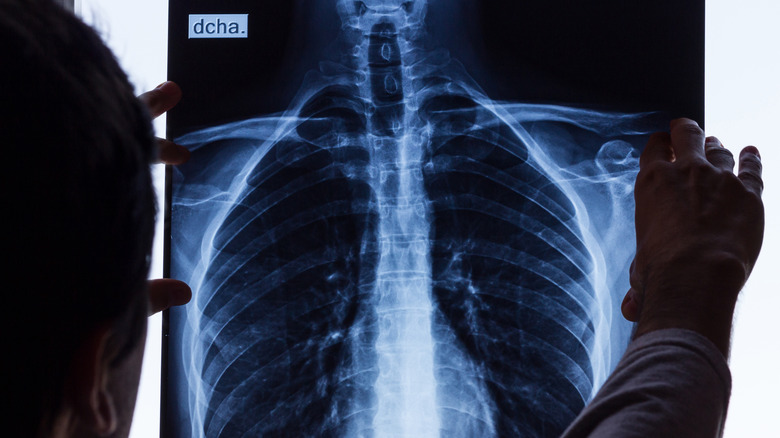Can Having A Broken Rib Make It Harder For You To Breathe?
If you've ever broken a rib or suspect that you may currently have one, you are well aware of how painful the experience can be. A broken or fractured rib has many causes, as per Yale Medicine. Some are more obvious, such as a vehicular accident or sports injury, while others can be more subtle, such as excessive coughing or engaging in repetitive movements of the upper body. Additionally, those with osteoporosis or bone cancer are more prone to rib breaks and fractures.
The symptoms indicating you might have suffered a rib break include severe pain in your chest that worsens if you touch it or twist your upper body, according to WebMD. This pain can also be made worse when coughing, laughing, or even breathing. Taking a deep breath will likely irritate your broken or fractured rib and result in extreme pain. Yale Medicine points out that difficulty taking a deep breath is incredibly indicative of a broken rib as your expanding lungs push up against the injured area, causing pain.
It's important to seek medical attention if you suspect you have injured one or more of your ribs and are experiencing pain when breathing. The Mayo Clinic warns that a broken rib can lead to serious complications, such as a punctured aorta or lung. It can also lead to secondary injuries to other essential organs and blood vessels surrounding the injured rib.
How a broken rib is diagnosed and treated
Upon a visit to your doctor or emergency hospital following an injury to your ribcage, you will likely undergo diagnostic procedures, as outlined by the Mayo Clinic. These can include one or more of the following: an X-ray, MRI, CT scan, or bone scan. While an X-ray will show whether there is a visible fracture or break, a CT scan and MRI will catch any potential damage to surrounding organs and tissue. A bone scan is used to detect stress fractures.
As far as treatment goes, the Mayo Clinic explains that there isn't much doctors can do to promote bone healing. In the past, doctors would advise patients to keep the ribcage wrapped in a compression band, but this is no longer recommended. Patients can obtain a prescription for pain relief to prevent breathing from becoming impaired, leading to pneumonia. Plenty of rest and ice for the sore area will also prevent further injury and provide some relief. In extreme cases, doctors may administer regular shots of a local anesthetic to the nerves surrounding the break until the pain is at a bearable level.
The American Association for the Surgery of Trauma adds that if diagnostic screenings find injury to the organs, tissues, and blood vessels surrounding the broken rib, additional procedures will need to take place before discharging the patient. These can range from ventilatory support for bruised lungs to various treatments for a punctured lung and other internal areas.


